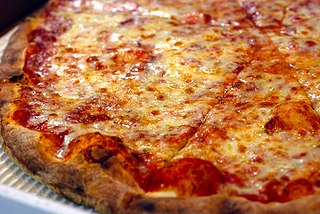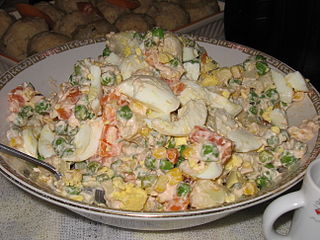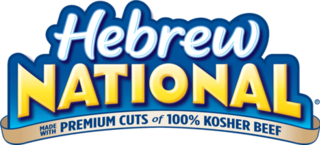Kashrut is a set of Jewish religious dietary laws. Food that may be consumed according to halakha is termed kosher, from the Ashkenazi pronunciation of the Hebrew term kashér, meaning "fit".

The hot dog or dog is a grilled or steamed link-sausage sandwich where the sausage is served in the slit of a partially sliced hot dog bun, a bun of size and shape to hold the sausage. It can also refer to the sausage of its composition itself. The sausage used is the wiener or frankfurter. The names of these sausages also commonly refer to their assembled sandwiches. Typical condiments include mustard, ketchup, mayonnaise, and relish, and common garnishes include onions, sauerkraut, chili, cheese, coleslaw, and olives. Hot dog variants include the corn dog and pigs in a blanket. The hot dog's cultural traditions include the Nathan's Hot Dog Eating Contest and the Oscar Mayer Wienermobile.

A delicatessen or deli is a retail establishment that sells a selection of fine, unusual or foreign prepared foods ("delicacies"). Delicatessen originated in Germany during the 18th century and spread to the United States in the mid-19th century. European immigrants to the United States, especially Ashkenazi Jews, popularized the delicatessen in American culture beginning in the late 19th century.

Halal, also spelled hallal or halaal, refers to what is permissible or lawful in traditional Islamic law. It is frequently applied to permissible food and drinks.

A hechsher is a rabbinical product certification, qualifying items that conform to the requirements of halakha.
A mashgiach is a Jew who supervises the kashrut status of a kosher establishment. A mashgiach may supervise any type of food service establishment, including slaughterhouses, food manufacturers, hotels, caterers, nursing homes, restaurants, butchers, groceries, or cooperatives. The mashgiach usually works as the on-site supervisor and inspector, representing a kosher certification agency or a local rabbi, who actually makes the policy decisions for what is or is not acceptably kosher. Sometimes the certifying rabbi acts as his own mashgiach; such is the case in many small communities.

The cuisine of New York City comprises many cuisines belonging to various ethnic groups that have entered the United States through the city. Almost all ethnic cuisines are well represented in New York City, both within and outside the various ethnic neighborhoods. New York City was also the founding city of New York Restaurant Week which has spread around the world due to the discounted prices that such a deal offers. In New York City there are over 12,000 bodegas, delis and groceries and many among them are open 24/7.

Kosher foods are those that conform to the Jewish dietary regulations of kashrut, primarily derived from Leviticus and Deuteronomy. Food that may be consumed according to halakha (law) is termed kosher in English, from the Ashkenazi pronunciation of the Hebrew term kashér, meaning "fit". Food that is not in accordance with law is called treif meaning "torn."

Jewish cuisine is a diverse collection of cooking traditions of the Jewish people worldwide. It has evolved over many centuries, shaped by Jewish dietary laws (kashrut), Jewish Festival and Shabbat (Sabbath) traditions. Jewish cuisine is influenced by the economics, agriculture and culinary traditions of the many countries where Jewish communities have settled and varies widely throughout the whole world.

Cholent or hamin is a traditional Jewish stew. It is usually simmered overnight for 12 hours or more, and eaten for lunch on Shabbat. Cholent was developed over the centuries to conform with Jewish laws that prohibit cooking on the Sabbath. The pot is brought to a boil on Friday before the Sabbath begins, and kept on a blech or hotplate, or left in a slow oven or electric slow cooker, until the following day.

Schwartz's, also known as the Montreal Hebrew Delicatessen, is a delicatessen restaurant and take-out, located at 3895 Saint-Laurent Boulevard in Montreal, Quebec. It was established in December 31, 1928 by Reuben Schwartz, a Jewish immigrant from Romania. It is kosher style rather than kosher. Its long popularity has led to it being considered a cultural institution of Montreal.
Marathon Enterprises, Inc. is a major regional supplier of meats and gourmet delicatessen products to the food service industry in the New York City metropolitan area. Headquartered in Englewood, New Jersey, it is a private corporation, and sells its products under the Sabrett brand name.

Tiv Ta'am is an Israeli supermarket chain, notable for being the country's most prominent purveyor of pork and other products not complying with the kosher dietary laws of Judaism. Tiv Ta'am is Israel's largest producer and supplier of non-kosher meat, and is also noted for most of its branches staying open during the Jewish Sabbath and on Jewish holidays. There are 32 Tiv Ta'am supermarkets throughout Israel, and the company is also involved in food processing and telecommunications.
We answer to a higher authority is a slogan used by Hebrew National, now a subsidiary of ConAgra Foods, for its brand of kosher-certified hot dogs and processed meats, which portrays the products as being of a higher quality than other, similar products. A 1997 article in The New York Times called the campaign "among the longest running and best known ever".

Montreal-style smoked meat, Montreal smoked meat or simply smoked meat in Canada, is a type of kosher-style deli meat product made by salting and curing beef brisket with spices. The brisket is allowed to absorb the flavours over a week, and is then hot smoked to cook through, and finally steamed to completion.
A kosher certification agency is an organization that grants a hechsher to ingredients, packaged foods, beverages, and certain materials, as well as food-service providers and facilities in which kosher food is prepared or served. This certification verifies that the ingredients, production process, and/or food-service process complies with the standards of kashrut as stipulated in the Shulchan Arukh, the benchmark of religious Jewish law. The certification agency employs mashgichim to make periodic site visits and oversee the food-production or food-service process in order to verify ongoing compliance. Each agency has its own trademarked symbol that it allows manufacturers and food-service providers to display on their products or in-store certificates; use of this symbol can be revoked for non-compliance.
Hershey Friedman is a Canadian billionaire businessman and philanthropist. His business concerns span the plastics packaging business and kosher meat in North America as well as luxury real estate development and Jewish books in Israel.

American Jewish cuisine comprises the food, cooking, and dining customs associated with American Jews. It was heavily influenced by the cuisine of Jewish immigrants who came to the United States from Eastern Europe around the turn of the 20th century. It was further developed in unique ways by the immigrants and their descendants, especially in New York City and other large metropolitan areas of the northeastern U.S.














